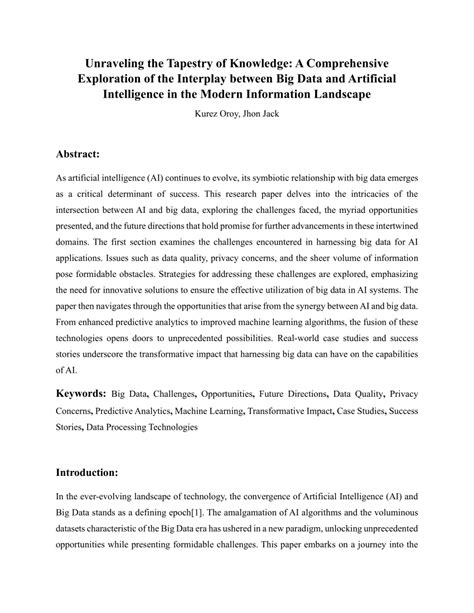Introduction

In the labyrinthine world of academia, where specialized fields have carved their distinct niches, interdisciplinary studies emerges as an innovative approach that transcends traditional boundaries. This transformative discipline weaves together perspectives from multiple disciplines to illuminate complex issues from novel viewpoints.
What is Interdisciplinary Studies?
Interdisciplinary studies is a collaborative endeavor that integrates knowledge, methods, and theories from two or more disciplines to address multifaceted problems. It recognizes that no single discipline can fully capture the intricate nature of real-world challenges. By synthesizing diverse perspectives, interdisciplinary studies fosters innovation, creativity, and holistic understanding.
Benefits of Interdisciplinary Studies
- Enhanced Problem-Solving: By leveraging diverse perspectives, interdisciplinary studies provides a comprehensive understanding of complex issues, enabling more effective problem-solving.
- Fosters Innovation: Interdisciplinary collaborations breed new ideas, as researchers challenge traditional assumptions and explore alternative approaches.
- Cultivates Critical Thinking: Interdisciplinary studies encourages students to evaluate information from multiple sources, develop critical thinking skills, and make informed decisions.
- Prepares for a Globalized Workplace: In a rapidly interconnected world, individuals with interdisciplinary training are highly sought after, as they possess the ability to navigate complex challenges and collaborate effectively.
Key Disciplines in Interdisciplinary Studies
Interdisciplinary studies draw upon a wide range of disciplines, including:
- Natural Sciences: Biology, Chemistry, Physics, Geology
- Social Sciences: Sociology, Psychology, Anthropology, Economics
- Humanities: History, Literature, Philosophy, Linguistics
- Arts and Design: Fine Arts, Performing Arts, Architecture
Examples of Interdisciplinary Studies
- Environmental Sustainability: Combines insights from ecology, economics, and policy to address pressing environmental challenges.
- Public Health: Integrates medicine, sociology, and epidemiology to promote health and well-being in communities.
- Global Studies: Explores the interconnectedness of cultures, economies, and political systems across the globe.
- Cognitive Science: Blends psychology, neuroscience, and computer science to understand the mind and its workings.
Table 1: Examples of Interdisciplinary Studies Programs
| Program | Disciplines Involved |
|---|---|
| Data Science | Computer Science, Statistics, Business Analysis |
| Sustainability Studies | Environmental Science, Economics, Social Policy |
| International Development | Sociology, Economics, Political Science |
| Gender Studies | History, Sociology, Psychology |
Tips for Success in Interdisciplinary Studies
- Develop a Solid Foundation: Establish a strong foundation in your chosen disciplines before embarking on interdisciplinary work.
- Embrace Collaboration: Seek out opportunities to collaborate with researchers from other disciplines and perspectives.
- Cultivate Communication Skills: Effective communication is essential for conveying ideas across disciplines.
- Be Open-Minded: Interdisciplinary studies requires a willingness to consider alternative viewpoints and learn from diverse sources.
Pros and Cons of Interdisciplinary Studies
Table 2: Pros and Cons of Interdisciplinary Studies
| Pros | Cons |
|---|---|
| Enhanced problem-solving | Can be time-consuming |
| Fosters innovation | Requires effective collaboration |
| Cultivates critical thinking | May lack depth in specific disciplines |
| Prepares for a globalized workplace | Can be challenging to navigate different academic cultures |
FAQs
- Is interdisciplinary studies a separate discipline? No, it is not a separate discipline but rather an approach that integrates knowledge from multiple disciplines.
- Do I need to major in interdisciplinary studies to pursue an interdisciplinary career? No, you can major in any discipline and pursue interdisciplinary work through research, collaborations, or graduate studies.
- What skills are essential for interdisciplinary studies? Critical thinking, communication, collaboration, and open-mindedness.
- What career opportunities are available with an interdisciplinary background? Researchers, consultants, policymakers, educators, and entrepreneurs.
- How can I find interdisciplinary research opportunities? Attend conferences, join research centers, and network with faculty from different disciplines.
- What is a new word that can generate ideas for new applications of interdisciplinary studies? Innovafusion (combines innovation and fusion to create groundbreaking solutions).
Conclusion
Interdisciplinary studies offers a transformative approach to understanding and addressing complex issues that transcend traditional disciplinary boundaries. By integrating knowledge, methods, and theories from multiple disciplines, interdisciplinary studies fosters innovation, creativity, and critical thinking. As the world becomes increasingly interconnected and challenges grow more complex, individuals with interdisciplinary training will be increasingly sought after for their ability to navigate diverse perspectives and develop comprehensive solutions.
